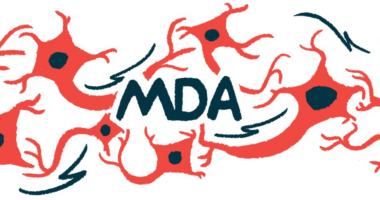Enzyme plays important role in protecting motor neurons: Cell study
Raising ALDH1A2 enzyme levels may lessen SMA motor neuron degeneration

The loss of SMN protein in spinal muscular atrophy (SMA) may lead to disease features by causing a deficiency in another enzyme called ALDH1A2, which is essential for the maturation and expansion of motor neurons, the cells that are lost in SMA, according to a new study.
The findings help to uncover the mechanisms by which SMN deficiency contributes to nerve cell degeneration in SMA, which still remain unclear.
Notably, boosting ALDH1A2 production in the motor neurons of mice lacking the SMN gene significantly reduced neuronal degeneration, supporting “the possible neuroprotective properties of Aldh1a2 against motor neuron degeneration in SMA,” researchers wrote.
The study, “Dysregulation of Aldh1a2 underlies motor neuron degeneration in spinal muscular atrophy,” was published in the journal Neuroscience Research.
SMA is caused by mutations in the SMN1 gene that result in low levels of the SMN protein, which is particularly important for the survival of motor neurons, the nerve cells that control voluntary muscle movement.
Reduced levels of the SMN protein cause motor neurons to degenerate and die, leading to symptoms like muscle weakness and fatigue, but the molecular mechanisms linking SMN deficiency to such degeneration remain elusive.
Researchers analyzed genes abnormally activated in SMA motor neurons
To shed more light on this, researchers at Nagoya University in Japan conducted a gene expression analysis to find genes that are abnormally activated in SMA motor neurons compared with healthy motor neurons.
They used motor neurons isolated from the spinal cord of mouse embryos. SMA cells came from animals lacking the SMN1 gene and carrying four copies of the backup SMN2 gene. Heathy motor neurons came from control mouse embryos without any genetic abnormality.
A total of 12 genes were differentially activated in SMA and control motor neurons, including eight genes that were increased in SMA cells and four genes whose activity was reduced in those cells.
Several of these genes are essential for the expansion and maturation of motor neurons in SMA, but one of them, called ALDH1A2, is particularly more active in lower motor neurons (which connect the spinal cord to muscles) than in upper motor neurons (which link the brain to the spinal cord).
Because only lower motor neurons are lost in SMA, this gene could provide a possible explanation for the selective loss of those cells — so researchers selected ALDH1A2 for further analyses.
Their experiments showed that reducing SMN1 levels in healthy motor neurons resulted in decreased ALDH1A2 expression in a dose-dependent manner. This meant that a more pronounced reduction in SMN1 led to a greater decrease in ALDH1A2 activity.
Moreover, motor neurons lacking SMN1 showed spheroid-like swelling in their fibers (axons), an early sign of degeneration, which was accompanied by activation of enzymes involved in programmed cell death, and ultimately neuronal death. Similar results were seen when cells were treated to reduce ALDH1A2 levels rather than SMN1.
However, delivering the ALDH1A2 gene via a harmless viral vector to SMN1-deficient motor neurons or motor neurons isolated from an SMA mouse model significantly reduced the number of axonal spheroids, suppressed the programmed cell death enzymes, and lowered neuronal death.
Marker of impaired autophagy reduced by boosting ALDH1A2 levels
Previous studies have suggested that motor neuron degeneration in SMA is caused by impairments in autophagy — a process responsible for the degradation and recycling of damaged and unwanted proteins and other cell structures.
The team showed that p62, a marker of impaired autophagy, was in fact increased in the axonal spheroid regions of SMA motor neurons, but increasing the ALDH1A2 levels lessened p62 accumulation.
The findings suggest that “expression of Aldh1a2 is regulated by SMN in motor neurons, and depletion of this molecule leads to neurodegeneration accompanied by axonal spheroids and [cell death] activation,” the team wrote.
“Developmental defects due to Aldh1a2 dysregulation enhances lower motor neuron vulnerability in SMA,” they concluded.









